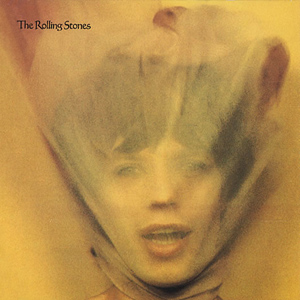The Rolling Stones – Goats Head Soup

Goats Head Soup (1973)
B+
1. Dancing With Mr. D 2. 100 Years Ago 3. Coming Down Again 4. Doo Doo Doo Doo Doo (Heartbreaker) 5. Angie 6. Silver Train 7. Hide Your Love 8. Winter 9. Can You Hear The Music 10. Starfucker
The drugs kick in big time, and the Stones start to coast. It may seem surprising that they followed up Exile with the worst album they’d ever done to this point (not counting December’s Children), but when you think about it, it’s not really surprising at all. I believe Mark Prindle said it best: “Between shows, all they did was shoot up and fall asleep… So that was their life. And that’s why Goats Head Soup sounds like this.” And what does it sound like? A bunch of slow, sleepy ballads and half-hearted rockers on which funky Billy Preston keyboards are more prominent than Keith’s guitar. In other words, not what the Stones do best.
Drugs were really taking a toll on the band at this point. Jimmy Miller, producer of the last four albums, had been reduced to Brian Jones-level uselessness, so although he’s credited as co-producer, GHS marks the first time Glimmer Twins (a pseudonym for Mick and Keith, for the uninformed) handled the production work themselves. Keith, meanwhile, was far more of a non-factor than he should ever be on a Rolling Stones record. His lack of influence was understandable, with him spending time in rehab and moving to Jamaica, one of the only countries he could legally exist in at the time (the band accommodated him by holding the album sessions there), while the album was being written and recorded. But that doesn’t make it excusable. With Keith either totally absent or contributing minimal instrumental input, Micks Jagger and Taylor are left to pick up the slack, to mixed results. MT plays some absolutely stellar guitar on this album, but even he can’t totally redeem obvious filler. For instance, he tears off some searing leads on the bluesy piano stomper “Hide Your Love,” but it’s ultimately inconsequential because Mick obviously made up the song in ten seconds and doesn’t do much to mask that fact. Similarly, Taylor plays an absolutely stupendous, majestic solo on Mick’s sappy ballad “Winter” that features such mastery of vibrato that Pavarotti himself wouldn’t know what hit him. And Mick does a nice job of dressing up in fancy clothes with a swelling string section and a great vocal performance. But that doesn’t change the fact that the song, underneath it all, is a slow, meandering bore. Though a very pretty bore.
However, when Taylor’s guitar is put to good use, he takes the band to places the Keith-led Stones just couldn’t go. Which isn’t something we’d have wanted to continue permanently, of course, but I don’t mind being able to catch a glimpse of one of the many different paths available to them at the time. Mick’s warm, poppy childhood nostalgia anthem “100 Years Ago” is one of my favorite Stones obscurities, and wouldn’t be the same if Taylor didn’t kick it into high gear on the stormy coda. Meanwhile, his solos coldly pierce the New York night sky on the brooding funk rocker “Heartbreaker” (presumably titled “Doo Doo Doo Doo Doo” to avoid confusion with the Led Zeppelin song of the same name, but it mostly comes off as some sort of poop joke), cut with Keith on bass, as Mick sings about police violence. Man, it’s a solid single, but it sure is a far cry from “Street Fighting Man”… Mick sounds more like he’s impotently whining about something he saw on the 6 o’clock news rather than projecting the pure anarchistic fury he would have back in ’68. Something had obviously changed.
So, what exactly does Keith contribute? Not a whole lot. He sings lead vocals on the ballad “Coming Down Again,” which, like “Winter,” is very pretty but meanders and goes on too long, but, unlike “Winter,” comes across as achingly sincere as Keith laments his struggles with heroin. He comes up with his millionth re-fried Chuck Berry riff on the giddy smut rocker “Starfucker” (re-titled “Star Star” in the U.S. Can’t say I’m surprised), which I nominate for best song on the album for the sole reason that it actually rocks (the only other Stonesy rocker on the album is “Silver Train,” which I liked better when it was faster and called “All Down The Line”). And the mid-tempo arpeggiated riff of “Dancing With Mr. D” is definitely his, but the song is one of their weakest album openers ever. Compare this attempt at sounding evil to, say, “Sympathy For The Devil”… one is like an actual trip to the gates of Hell, and the other is like a ride through a kitschy amusement park haunted house. And MT’s hat in the promo video certainly doesn’t help matters. So I guess that makes Keith’s best contribution the one song you probably thought Mick wrote: the number 1 hit “Angie,” which is about as good as string-laden pop ballads get. Mick’s vocals are pretty stupendous, and proved he could clean up and tenderize his delivery for AM radio consumption. There’s always been speculation about who Angie is supposed to be, mostly centering around an alleged love triangle between Mick, David Bowie and his wife Angela. But, like with most chicks in rock songs, the answer is less thrilling than that: she’s a fictional character with just the right amount of syllables in her name.
It’s true that the burden of following up Exile was an impossibly weighty task. But the Stones succeeded in following up Beggars Banquet, Let It Bleed and Sticky Fingers pretty darn well. GHS fails in that regard. Yes, it suffers by inevitable comparison to its predecessor, but putting that aside, these Stones—the mellow, languid ones—aren’t the Stones I love. But at least they’ve got Mick Taylor playing guitar for them.
